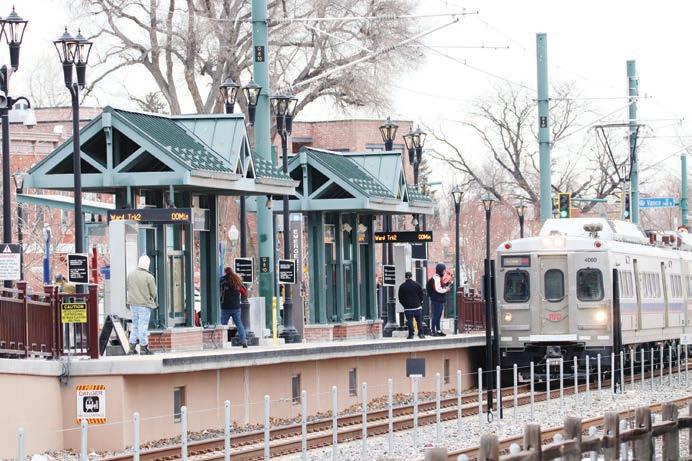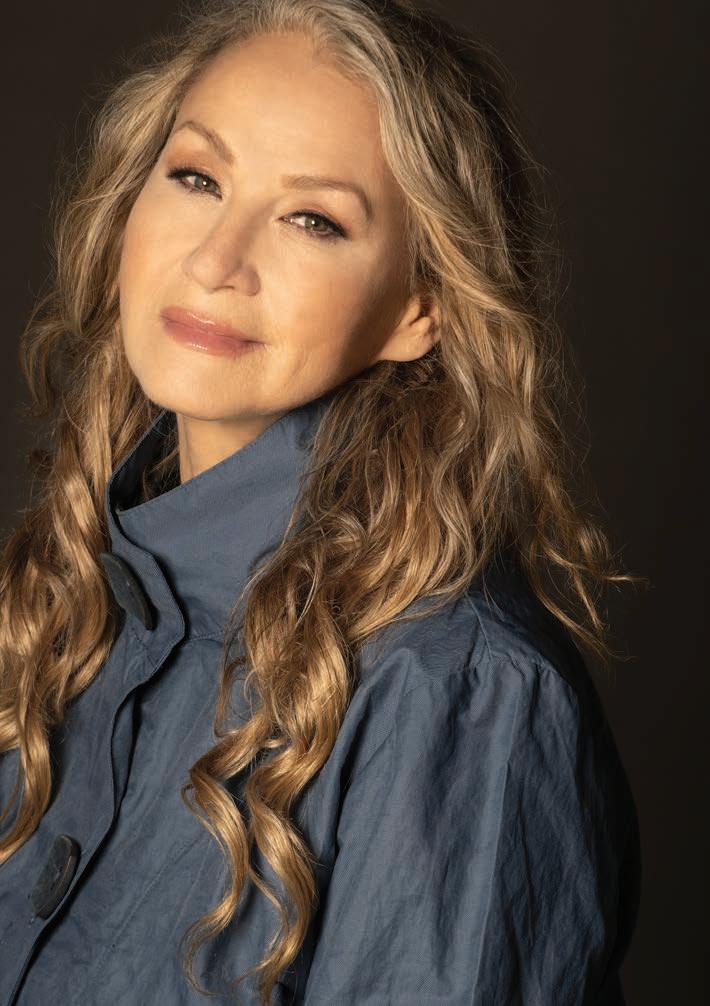
6 minute read
Art comes to Denver Botanic Gardens
Me lanie Yazzie’s “Peace Walking” exhibition is open in the Freyer-Newman Gallery at Denver Botanic Gardens, 1007 York St., Denver, through May 29, 2023.
e exhibit is based on Yazzie’s interpretation and meditation on the Dine’ (Navajo) prayer, “Walking in Beauty.” e exhibit features more than 40 paintings, prints and sculptures that draw on childhood memories, travel stories and more. She will speak at 6 p.m. on March 9 and there will be a reception from 5 to 8 p.m. on Feb. 24. Yazzie is professor of arts practices and head of printmaking at CU Boulder. Open with garden admission. See botanicgardens.org.
Littleton Museum
“Nature’s Blueprints: Biomimicry in Art and Design” is open at the Littleton Museum, 6028 S. Gallup St., Littleton, through March 15. It brings together art, design and environmental science and will have interactive learning stations as well as art, artifacts and photography. Free.
Call for artists
Call for Artists: Jurist open call at CORE Art Space, 6501 W. Colfax Ave., Lakewood: “Rose Colored Glasses” Feb. 17 to March 5. Juried by Dana Cain, who will jury pieces in a nationwide exhibit focused on what seeing the world through rose-colored glasses might mean to an individual artist. A glass half full? Filled with pink lemonade? Pink champagne? Gallery hours: Friday: 5 to 10 p.m.; Saturday and Sunday: noon to 5 p.m. See coreartspace.com.

Duke Ellington
“Duke Ellington’s Sophisticated Ladies” features music by Duke Ellington, celebrating his legacy: “Take the A Train” and other favorites. rough March 5 at Vintage eatre, 1468 Dayton St., Aurora.
Performances: Friday/Saturday, 7:30 p.m.; Sunday, 2:30 p.m. Directed and choreographed by Christopher Page-Sanders. 303-856-7830, vintagetheatre.org.
Englewood art show
Englewood Art Exhibit is open at the Malley Recreation Center, 3380 S. Lincoln St. in Englewood. Monday to ursday, 8 a.m. to 7 p.m.; Friday, 8 a.m. to 5 p.m.; Saturday, 9 a.m. to 1 p.m.
Stories on Stage
“An Afternoon with best-selling author Peter Heller” at 2 p.m. Feb. 19 at Su Teatro, 721 Santa Fe Drive, Denver. Actors Tim McCracken and Allison Watrous will read from Heller’s books and Heller will read from his novel “ e Dog Stars” and stay for a discussion afterwards. A virtual premiere will be available at 7 p.m. Feb. 23 and can be watched after that date. See storieonstage. org. Note: Su Teatro requires masks.
For in-person attendees, there will be an on-call list at the front table.
Littleton Symphony


Littleton Symphony will perform at 7:30 p.m. on Feb. 10 with guest conductor Brandon Matthews. Littleton United Methodist Church, 5894 S. Datura St., Littleton. Tickets: 303-933-6824, littletonsymphony.org.
Wonderbound
“Reckoning at the Red Herring Tavern,” a new creation by Won-
Growth
FROM PAGE 22 themselves with making an idea — to run a train line along decommissioned railroad tracks — into a reality to make sure Olde Town began to thrive.
Eventually, the G Line opened in 2019 and development began to spring up.

It didn’t happen without opposition, though. Residents voiced concerns over sacri cing the historical character of the town. In fact, the city faced lawsuits from a group called All the People regarding approving development plans to add to the transit oriented development, derbound dance company Artistic Director Garrett Ammon, features original classic dance music by Tom Haggerman of DeVotchKa. March 2-12. Location: 3865 Grape St., Unit 2, Denver. 303-292-4700, wonderbound.com. Note — some performances are sold out.
Town Hall or TOD. e city prevailed and the new transit oriented development transformed Arvada, Cook said. It created a center that attracts citizens from around the area and which bene ts merchants, restaurants and others. nonpro t works with young people who are coming out as transgender and nonbinary.
Next at Town Hall Arts Center: “I Love You, You’re Perfect, Now Change.” Feb. 17-March 19. 2450 W. Main St., Littleton. 303-794-2787, ext. 5, townhallartscenter.org.

All of that can also be attributed to the mixed-use, higher density design model, where someone can live above a bakery or right next to a co ee shop.
With less emphasis put on cars, which Cook sees as a good thing, residents can live in a place where they can walk to various places. She said it contributes to more of a family feel.
See more on urban sprawl online at coloradocommunitymedia.com/ longwayhome/index.html.
“And we have to deal with schools, we have to deal with parents. And often the parents are not supportive, so complaints then come in against those therapists who are trying to protect those youth.
“And then those youth end up being harmed not only from the parents, but also from the school district, also from the insurance companies, and it’s literally therapists trying to support those youth,” Jae said.
In Colorado, a person 12 years of age or older can get psychotherapy services with or without the consent of their guardian if the mental health professional determines the minor is “knowingly and voluntarily seeking the psychotherapy services and the psychotherapy services are clinically necessary,” according to the Colorado General Assembly’s website.
“We have parents who will literally call and be like, ‘I know you’re seeing my child.’ And the way that we hold con dentiality, we will say, ‘I have no idea what you’re talking about,’” Jae said.

“And, because you don’t give that information, a complaint comes into DORA, DORA has to investigate it, and it comes out of our pockets. It goes against our insurance, and we, then, have to nd a lawyer to be able to confront them — but then also, it takes away from actually supporting youth,” Jae said, explaining parents sometimes get the school involved, creating another challenge.
According to the Trevor Project’s survey, 42% of LGBTQ youth identied school as an a rming space. Approximately 22% reported their family as o ering high social support, compared to 78% saying their family o ered low to moderate support.
Haden said Envision:You aims to develop an integrated wellness campus that includes transition housing for youth, permanent housing for older adults, a clinic and a wellness center.
“We’re focused on intergenerational programming (and) how we can create opportunities for young people that are unhoused and have been through extraordinary trauma,” he said, adding he would like to discuss it with Crow.
Hate crimes
A focus of Crow’s community listening session was highlighting ways to prevent and address incidences of bias-motivated crimes, otherwise known as hate crimes.
As previously reported by Colorado Community Media, reported incidents of hate crimes in Colorado more than doubled from 2018 to 2020, according to data from the FBI. However, o cials still highlighted underreporting of hate crimes as a large concern.
“People are concerned when the hate crime numbers go up,” said Dana Juniel, the executive vice president of strategy and communications at the Matthew Shepard Foundation.
“And actually, it might mean that we’re actually doing the work to report the crimes that are happening regardless,” Juniel added.
Many jurisdictions in the country, including in Colorado, are reporting zero hate crimes occurring in their jurisdictions, Crow said. ornton, for example, reported zero hate crimes.
“We know that’s not true,” Crow said. “So, there’s a trust de cit, of course, and a training de cit, both with the community and with law enforcement to gure out: How do we actually get the reporting, get people comfortable with reporting, and o cers trained to be able to receive that properly?” e Matthew Shepard Foundation, in partnership with Out to Protect, o ers a “Hate Crimes Investigations for Law Enforcement” course that aims to teach rst responders how to recognize, document and investigate hate crimes, according to the training’s website.
Juniel highlighted the need to get realistic numbers because “we know that money comes from the data,” adding such funding can help support community resources that are a rming for people to go to.
If o cers, however, are not properly trained on what hate crimes are, the underreporting of hate crimes will continue, Juniel explained.
“We are providing scholarships — scholarships to law enforcement who are interested in taking the online training in partnership with Out To Protect,” Juniel said.
Such training has helped lead to an increase in LGBTQ liaisons at agencies, Juniel said. ese liaisons, such as those at the Denver Police Department, aim to strengthen the relation- ship between police and the LGBTQ community through community involvement and educational e orts.
“Di erent from in the mental health space, these resources already exist. We just have to apply it,” Juniel said.
The need for action

April Owen, director of the Transgender Center of the Rockies, said the conversation showed her the de cit between the transgender community and the services that are available and how well agencies are meeting the community’s needs.
“I’m just thinking about how quickly we kind of need to move on this because I think more and more trans people are coming to states like Colorado,” Owen said, explaining she thinks legislation in some states has led people to move.
“I’m just worried about how to catch up and, kind of, meet the needs of everyone,” she added.
Jae said last year alone, more than 100 families living outside of Colorado reached out to YouthSeen looking for services in the state.
At the end of the meeting, Crow said he wrote down action items for him to take. e list included discussing a potential collaboration with the University of Colorado’s medical school to incorporate LGBTQ issues into its curriculum, as well as evaluating law enforcement training and “talk to the chief law enforcement o cers in the district and make sure that they understand this is a community priority.”
“ ank you all,” Crow said. “We appreciate the opportunity and (have) some very concrete takeaways.”





